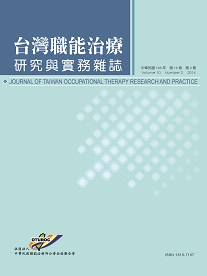Journal of Taiwan Occupational Therapy Research and Practice

半年刊,正常發行
愛德華氏症患者 1 歲以上的存活率僅 8.4%,且相關早療文獻罕見。因此,本文探討確診為愛德華氏症之 7 個月大女嬰,執行桃園醫院以家庭為中心特約門診模式之成效。方法:從 106 年 3 月至 107 年 1 月期間,由一名專職早療醫事人員定期介入,採用加拿大職能表現測驗 (COPM) 進行半結構式晤談,與家長共同討論並設立目標及擬定居家計畫,使照顧者賦能,並另外安排每週 3 次的職能及物理治療。結果:經過 16 個月介入後,照顧者的目標由處理疾病轉變為針對功能性的發展目標。使用 COPM 評核,個案的表現及照顧者滿意度差異皆達 2 分,且於 GMFM2-88、嬰幼兒感覺處理能力剖析量表與零歲至六歲兒童發展篩檢量表等前後測比較,發現兒童粗動作、知覺認知的發展及感覺處理能力皆有改善。結論:對存活超過 1 歲的愛德華氏症患者,提供以家庭為中心的早期療育,可有效提升主要照顧者的親職能力,維持兒童肢體功能,提升粗動作、知覺認知的發展及感覺處理能力。
Background and purpose: For liveborn infants with trisomy 18 (Edwards syndrome), the estimated probability of survival to age 1 month was 38.6% and to age 1 year was 8.4%, and there was few literature referring to rehabilitation. The study aimed to investigate the effectiveness of Family-Centered Early Intervention Special Clinic in Taoyuan General Hospital for a 7-month-old female case with Edwards syndrome. Method: From March 2017 to January 2018, this case had multiple physical structure abnormalities and severely developmental delay, and the family were anticipating the enhancement of their child’s ability by early intervention. The case’s mother agreed to participate in the program of Family-Centered Early Intervention Special Clinic in Taoyuan General Hospital, which a full-time medical professional (therapist) would regularly conduct a semi-structured interview with parents using the Canadian Occupation Performance Measure (COPM) to discuss and set goals and home programs for family empowerment. Additional occupational therapy and Physical therapy was provided 3 times per week. Result: After 16 months of intervention, goals of the caregiver had changed from targeting disease itself to functional development. Using the COPM, the performance score and satisfaction score of COPM had all improved over 2 points. And using the GMFM2 and 0 to 6-year-old child development screening scale, it had also shown improvement in gross motor development, cognition, and sensory process ability by the pretest-posttest comparison of 0 to 6-year-old child development screening scale, GMFM2-88, infant/toddler sensory profile, and PROM. Conclusion: For Edwards syndrome cases over 1 year old, offering family-centered early intervention is effective to empower the parents, maintain child’s physical function, and improve the development of child’s gross motor, cognition, and sensory processing ability.












